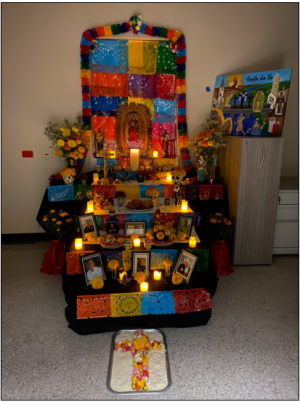LAREDO — As the U.S.-Mexico border community observes the All Souls Day (Día de los Muertos) holiday, U.S. Customs and Border Protection officials representing Laredo Field Office ports of entry are advising the traveling public that certain agricultural items used in holiday decorations are prohibited from entry to the U.S. and can carry harmful pests and disease, such as the citrus greening disease. Also, CBP would like to remind the public of prohibited fruits that tend to be brought by travelers during this holiday period.
“As we draw closer to All Soul’s Day, we see an increase in travelers bringing items from Mexico to decorate altares to honor their departed loved ones and want to remind them not to bring in prohibited citrus and floral arrangement fillers,” said Director, Field Operations Randy Howe, Laredo Field Office. “Our CBP agriculture specialists conduct agricultural examinations every day, and their work is critical in preventing plant pests and diseases not known to exist in the U.S. from taking root and inflicting ecological and economic harm on American agriculture.”

Altar in Laredo for Dia De Los Muertos (Contributed/CBP)
Many border community families celebrate Día de los Muertos by constructing altares (altars) to commemorate the lives of loved ones that have passed on. A common type of ornamental greenery known as murraya or orange jasmine is often used in the construction of altares. Murraya is a host plant for the Asian citrus psyllid, Diaphorina citri Kuwayama, an insect that can carry citrus greening disease and is therefore prohibited from entry into the U.S.
Citrus greening, also known as “huanglongbing,” is a disease caused by a bacterium that can infect most citrus varieties and some ornamental plants (such as orange jasmine); this disease was first detected in the U.S. in 2005 in the state of Florida, Miami-Dade County. According to the U.S. Department of Agriculture (USDA), the disease has seriously affected citrus production in India, Asia, Southeast Asia, the Arabian Peninsula and Africa.
Citrus fruit that is prohibited from personal importation includes the following: oranges, grapefruit, tangerines, sour oranges and sweet limes. Other popular fruits that also are prohibited include guavas, mangoes, peaches and pomegranates.
Failure to declare prohibited agricultural items also can result in fines. Penalties for personal importations of undeclared, prohibited agricultural items, depending on the severity of the violation, can run as high as $1,000 and up to more than $250,000 for commercial importations.
Subscribe to the LIVE! Daily
Required






Post a comment to this article here: